Twelve years ago, the school saw an important moment of its history. On this week in 2010,teachers and students walked through the gates of Wuding campus, in the move from the school’s temporary home at Shanghai No. 3 Girls' High School. Today, the school looks back at this journey, including the challenges overcome, the support of the community, and the precious memories that have been made during the school’s journey so far.
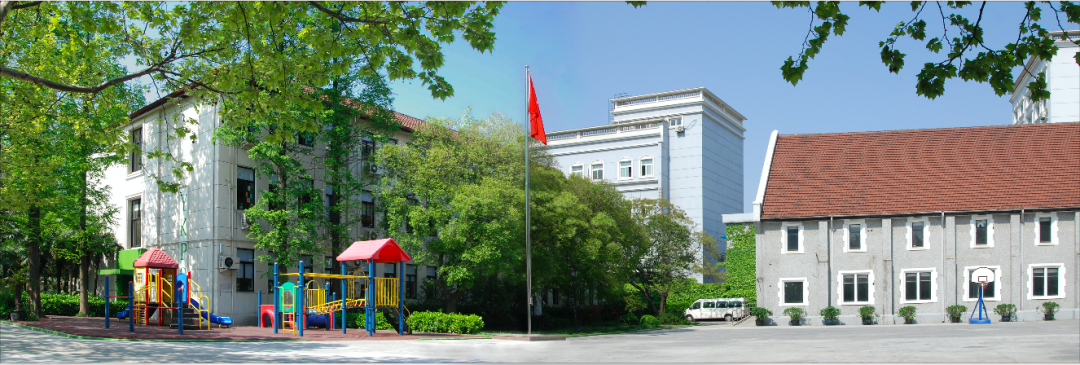

“One of the most important lessons my father taught me is that you can only reach your full potential by standing on your own two feet. Almost everything you have can be taken away by circumstance, the one thing that cannot be taken away is a good education.”
——Professor Anna Sohmen Pao
Mr. YK Pao was known as the “King of the Sea.” Though his business was global in reach, he always remembered that his roots were in China. He had a global perspective but a Chinese heart, always reminded his family to remember their homeland, and had full confidence in China’s “reform and opening up” and the drive for modernisation. Further, he believed that a strong educational system provides the foundation for a strong country. To this end, he spared no effort in supporting the development of education in China and successively donated funds to build schools and libraries, alongside establishing scholarships.
Carrying on YK Pao’s emphasis on education, the Pao family’s passion for educational philanthropy is enduring. Philip Sohmen recalled in an interview: "In 2005, my mother and I decided that we wanted to build a school that was rooted in China, with a global perspective. We travelled to many different cities in the country that were considered for the school’s location. Shanghai’s inclusive and open culture impressed us and we thought that basing the school in Shanghai would be best.”
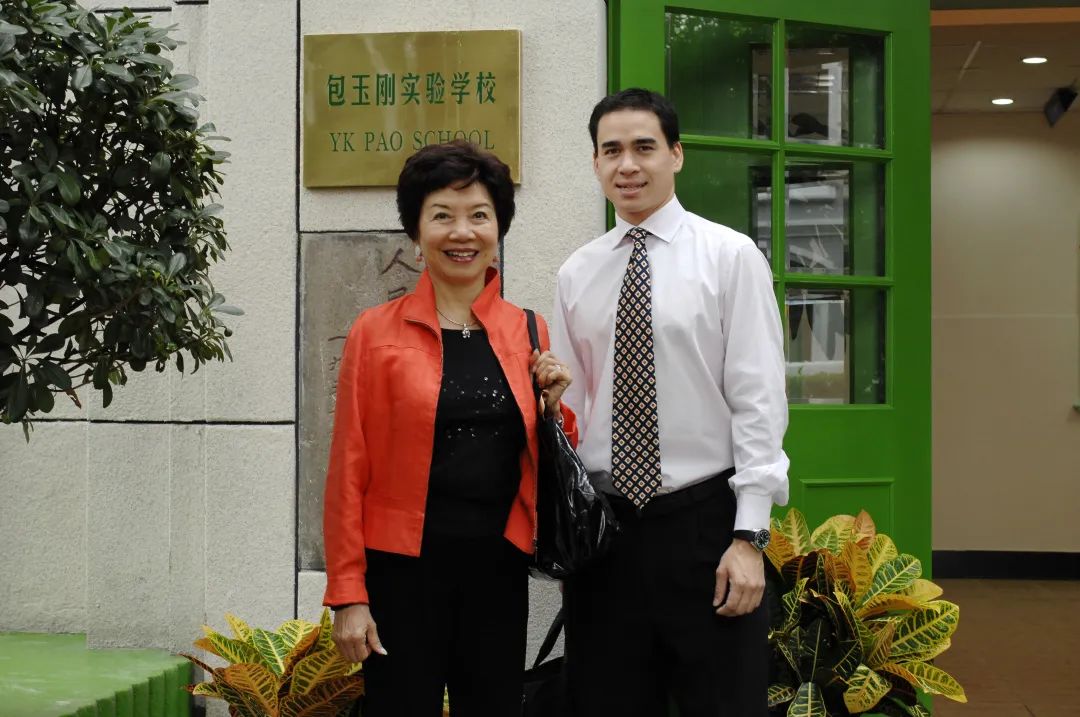
Professor Anna Sohmen Pao and Philip Sohmen in front of the Liuyi Building at Shanghai No. 3 Girls’ High School in 2007
Around this time, Philip Sohmen was living overseas and was just starting his career. He decided that he would carry on the family tradition of developing education in China to serve the country, saying, “Our family has always been focused on education. We feel that education will determine China’s future and can change the country for the better.”
Continuing, Philip Sohmen notes, “My grandfather focused on university education, while we felt that China’s basic education needed to be changed. I observed a group of Chinese students in summer camp and felt that they were excellent in many regards but needed a more well-rounded education.”
Thus, when he received a call from his mother, he resolutely decided to give up his well-paid work overseas and return to China to pursue this dream with her. In his mind, there is nothing more meaningful than education.
“Many people have asked me why I got involved with education rather than working in the family business. My answer is that education is a part of my family’s business. Especially in today’s China, as it faces the demands of an economy and society in transition, the trends of globalisation and digitalisation, and the needs of supporting an aging society, it is important that we provide future generations with an outstanding whole-person education. Students should be given an education that equips them with not only the knowledge, but the skills, values, and attitudes needed to succeed in life. To do this is of deeper significance than profit or material gain.”
——Philip Sohmen
Executive Deputy Chairman
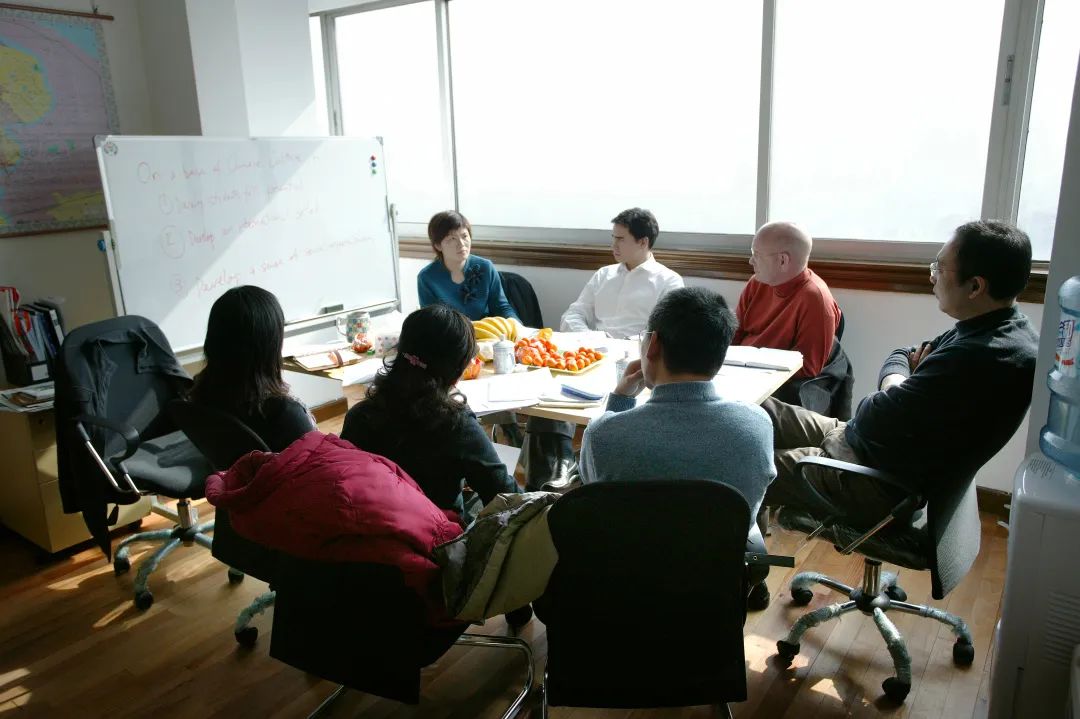
The founding team together at a meeting
After they decided to set up a school in Shanghai, Professor Anna Sohmen Pao and Philip Sohmen invited Madam Tan Fuyun to join them in establishing the school. Madam Tan Fuyun was formerly the assistant to the Director of the Hong Kong branch of Xinhua News Agency and had also served as the Director of the Shanghai Federation and Vice-Chairman of the All-China Women's Federation.
Madam Tan Fuyun once recalled: "During my work in Hong Kong, I was in close contact with YK Pao. He had an excellent reputation and was highly respected far and wide. What I admire most about YK Pao is that he advocated education and cultivated talent throughout his life. He was not only a model of a self-made person, but also played a crucial role in furthering education in China, which has been highly beneficial for the country.”
It is worth noting that, as preparations were being made for Pao School before it opened, then Shanghai Party Secretary Xi Jinping cordially met with the three founders, discussed Shanghai’s spirit of inclusiveness, and invited them to set up a school in the city.
Both Mr. Lu Ping, former Director of the Hong Kong and Macau Affairs Office of the State Council, and Mr. Xie Shengwu, former President of Shanghai Jiao Tong University, are grateful to YK Pao for his selfless investment in China’s modernisation, especially in the area of education. When they learned that Professor Anna Sohmen Pao was planning to set up a pioneering Chinese non-profit school with an international perspective, they readily accepted her invitation to serve as members of the Pao School's first board of directors – as part of which they would offer advice for the school's development. In addition, municipal Party committees, municipal governments, leaders from all levels in Changning District, Songjiang District, and other related groups also provided important support that enabled the establishment of Pao School.
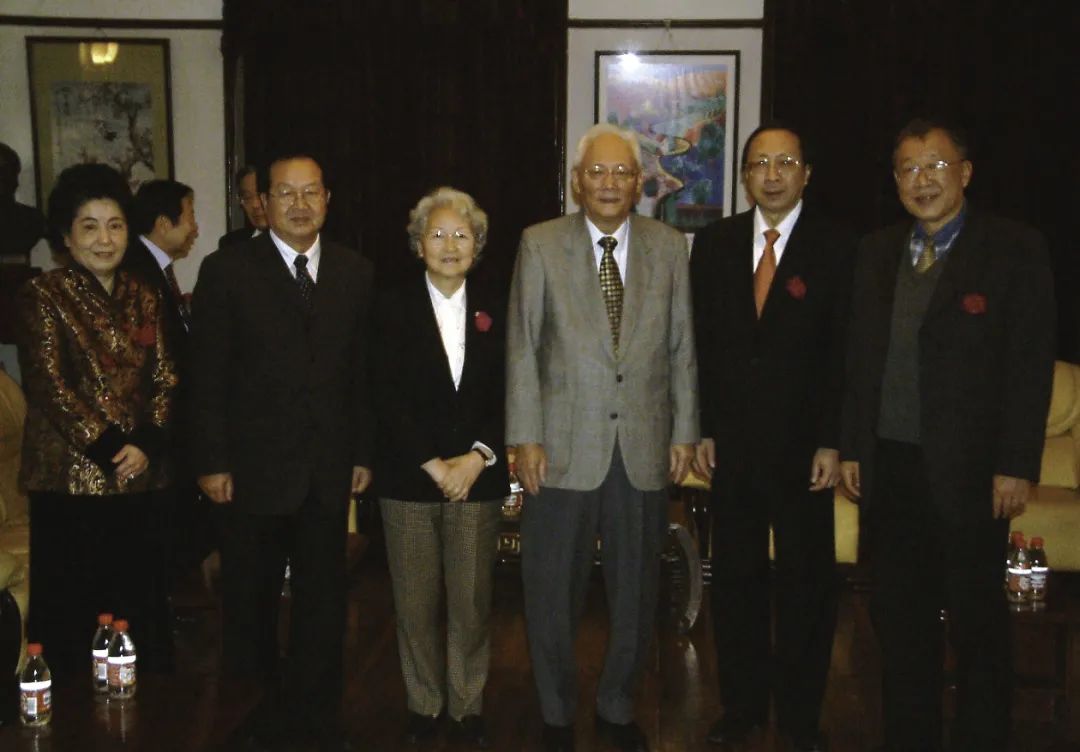
Pao School Founding Governors, Lu Ping, former Director of the Hong Kong and Macao Affairs Office of the State Council and Xie Shengwu, former President of Shanghai Jiao Tong University, accompany Xie Lijuan, former Vice-Mayor of Shanghai, and Zhang Weiwen, former Mayor of Ningbo, to the school’s opening ceremony
As the dream began to come to fruition the hard work began, from determining the school site, to hiring school leadership, recruiting teachers, publicising information about the school, and enrolling students. These all became top priorities and all had to be carried out meticulously. At that time, the first cohort of students planned to matriculate in 2007, because this was the 10th anniversary of Hong Kong’s return to the motherland, and the preparation time was tight.
One of the core members of the founding team, Zang Na, Dean of High School External Affairs, recalls that the school officially began the preparatory stage in 2006. At that time, the entire team, including Philip Sohmen, was crowded into a renovated apartment near the school. One bedroom was used for office work, team members worked in the living room, and the kitchen was converted into an accounting office. The apartment had no air conditioning or heating, so it was cold in winter and hot in summer. There were even cockroaches scurrying around at night.
Though others tried to encourage Philip Sohmen to move to a more comfortable hotel, he insisted on being with team members. Fortunately, with the assistance and support of the Municipal Party Committee, governments at all levels, and related parties, Pao School opened on 1st September 2007 at a temporary site in the Liuyi Building of Shanghai No. 3 Girls’ High School.
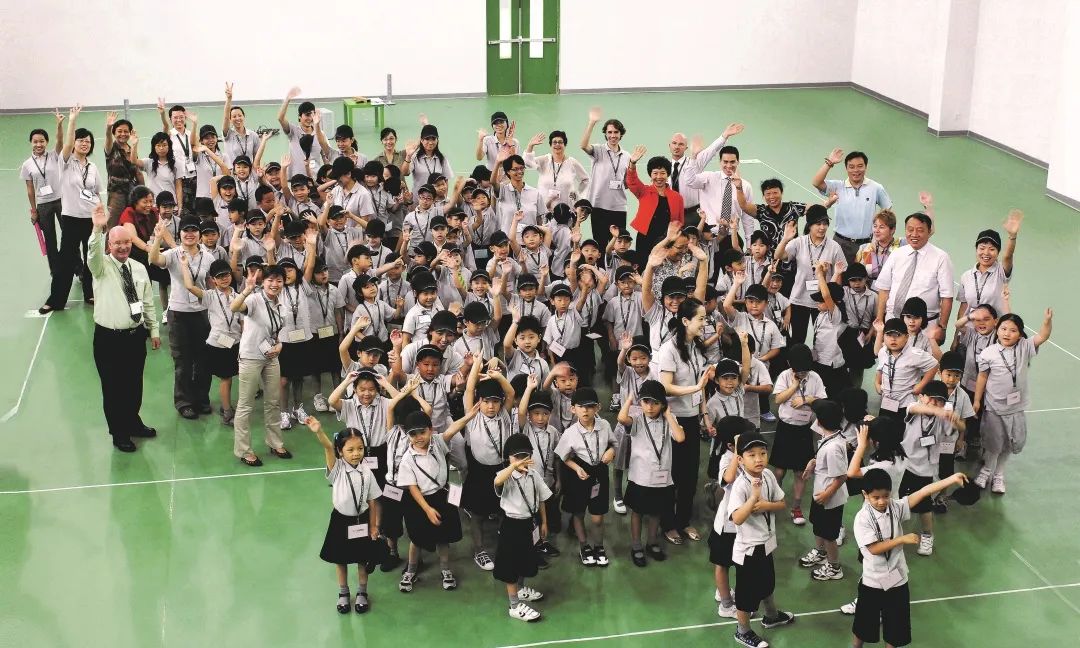
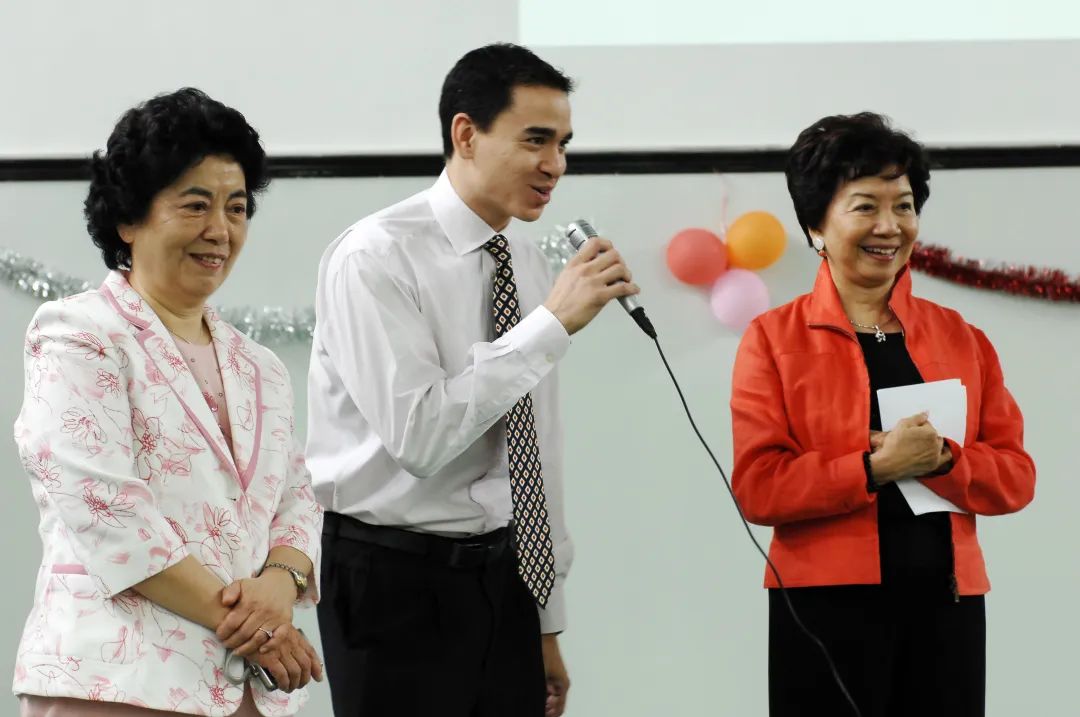
The first day of school in 2007
What impressed everyone the most was the hands-on attitude of the founders, who led by example. According to Cynthia Zhang, a key member of the founding team and former Director of the Student Affairs Office, remembers that, when making the first admissions handbook, Professor Anna Sohmen Pao said that she would give feedback as soon as possible. Cynthia’s team worked until 10pm in the evening and finally completed the first draft of the document. After Professor Anna Sohmen Pao received it, she worked until 3am to make the revisions, staying true to her words. It was a very detailed revision, down to every punctuation mark and capitalisation.
The can-do spirit is also vividly reflected in Madam Tan Fuyun, one of the founders and former Vice-Chairman of the All-China Women's Federation. Tan Fuyun provided detailed revision suggestions for every document she received, including punctuation and wording in English.
At that time, the Pao School had no campus of its own, no students, and was unknown. The admissions team led by Cynthia could only use rudimentary methods to publicise information about the school. They distributed leaflets on the street and worked assiduously to approach kindergartens, where potential students for Pao School could be found. She still clearly remembers that at that time, a kindergarten allowed her to visit and introduce Pao School, so she and Philip Sohmen visited the kindergarten classroom by classroom. She stood on the podium introducing Pao School, while Philip Sohmen sat nearby patiently listening, holding leaflets for interested parents and answering whatever questions they had.
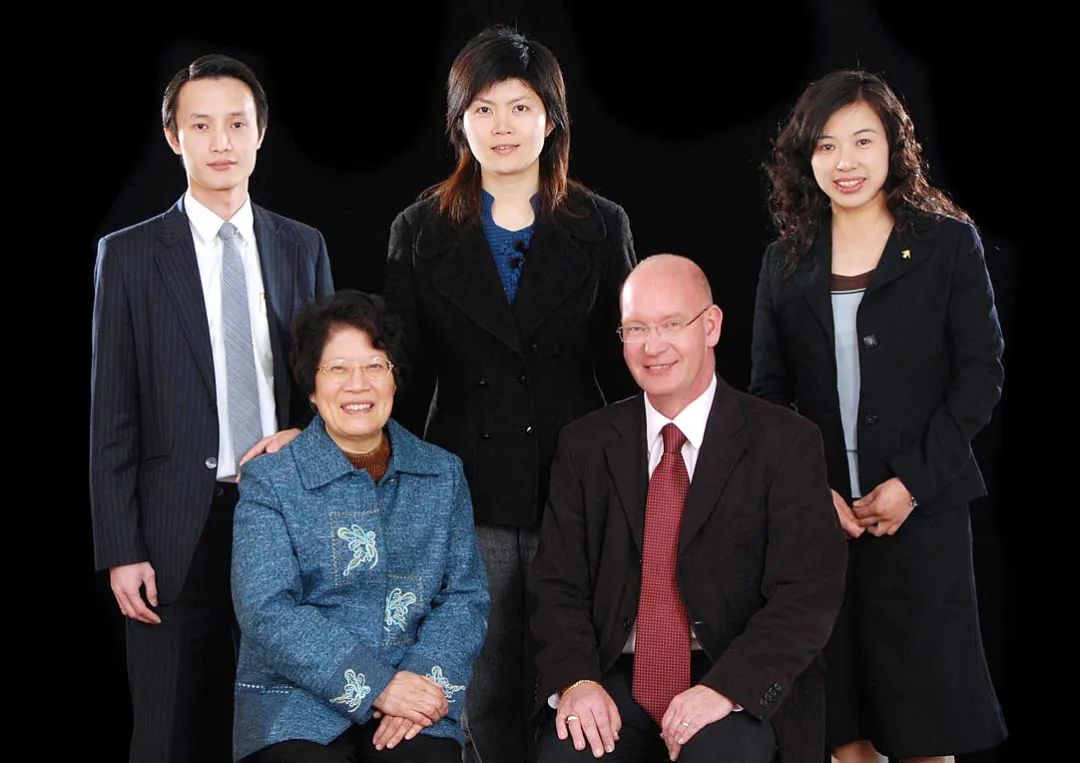
Founding management team:
Back row: Guo Zhanchao, Crick Chen, Cynthia Zhang
Front row: Ni Guyin, Warren Johnston
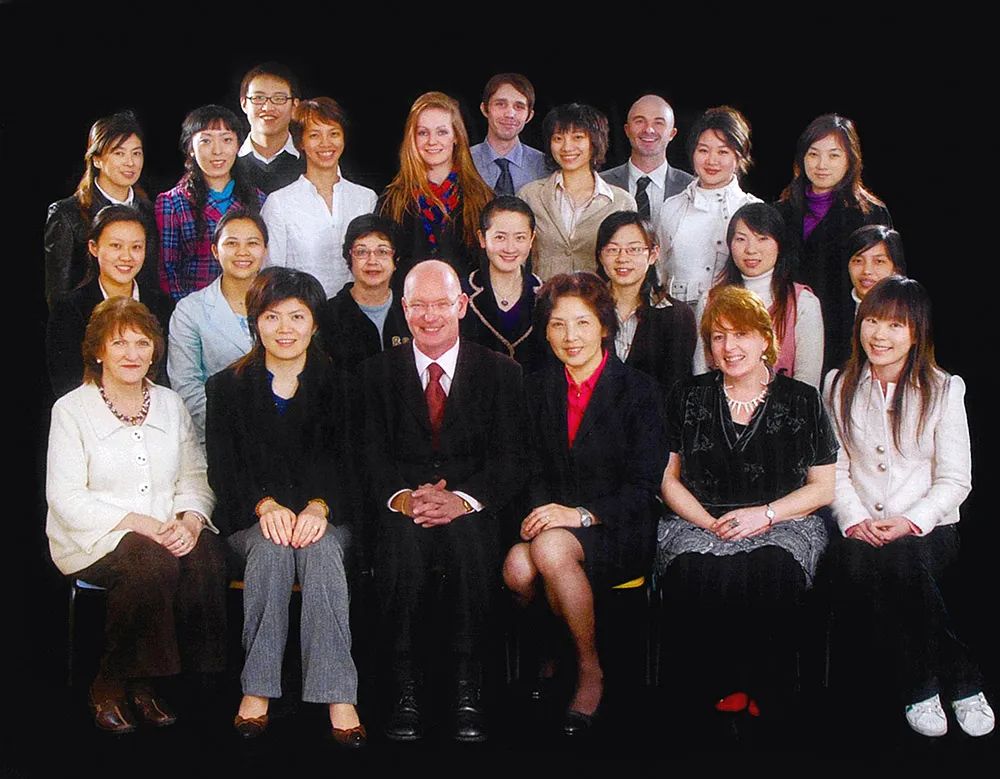
Founding Teaching Team
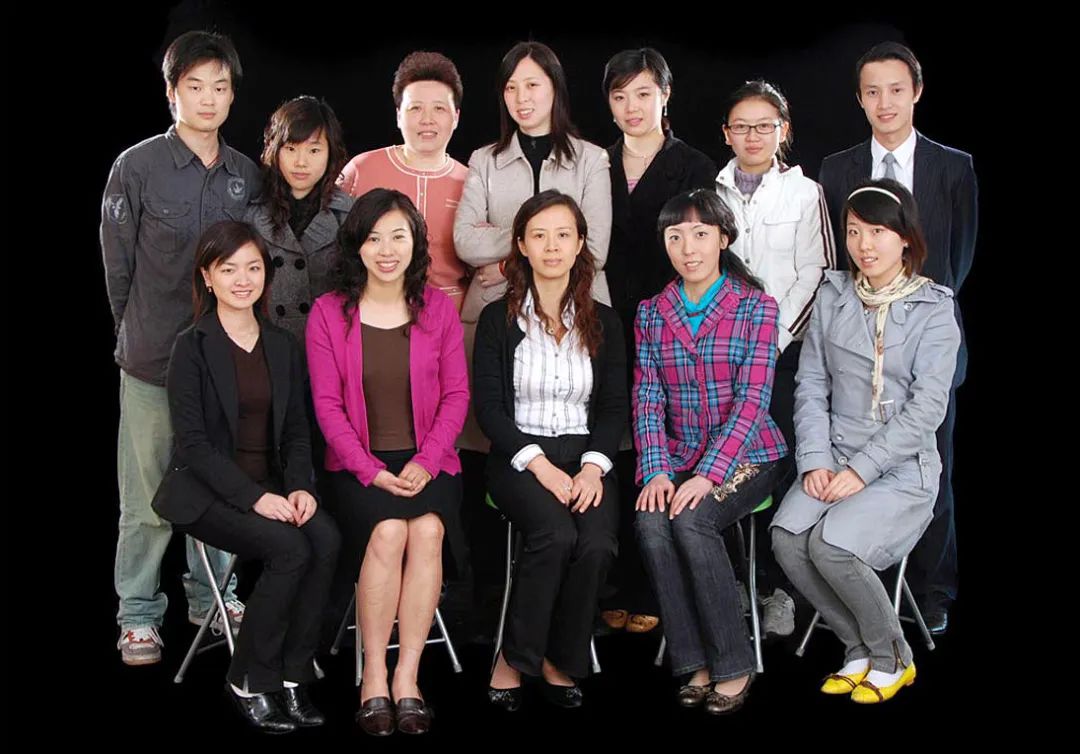
Founding Administrative Team
When considering their child’s education, parents tend to focus on a school’s curriculum and teacher allocation. Thus, as leadership began preparing for Pao School’s opening, the founders invited Ms. Ni Guyin, the founder of Happy Education, to be the school’s Headmistress. Although Headmistress Ni had already retired at the time, she devoted herself to Pao School and worked with several retired principals of prestigious schools to set up the school’s mentor group. This mentor group played a key role in developing a multi-faceted curriculum for Pao School, built around the Shanghai curriculum at the compulsory education stage.
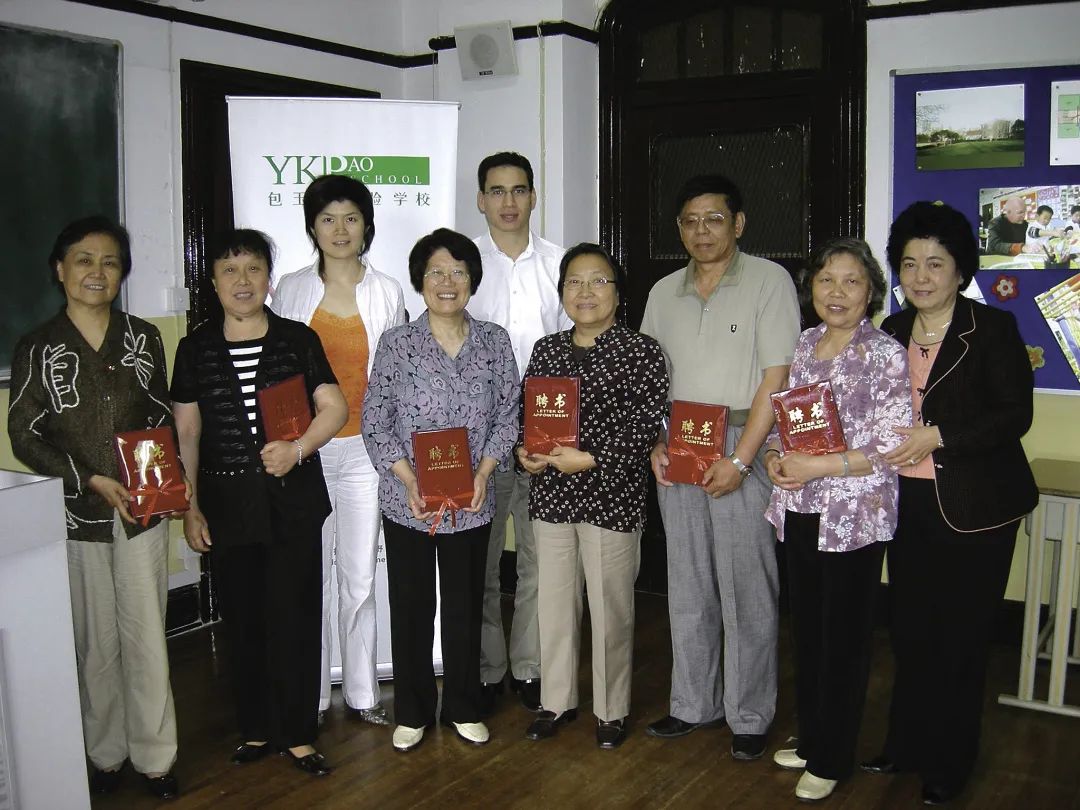
Madam Tan Fuyun, Deputy Chairman Philip Sohmen and Primary Deputy Principal Crick Chen welcomes Founding Headmistress Ni Guyin to establish the YK Pao School Mentors Group, consisting of renowned educators: Li Aizhen, Chen Beilei, Shi Huifang, Chen Xiantong and Yin Guofang (mentors from left)
Parents, at the time, were especially focused on the school’s curriculum and teaching resources. Crick Chen, a core member of the founding team and the current Primary Deputy Principal, says that since the course preparation and enrolment were carried out simultaneously, it was unknown how many students would enrol, the level of their bilingual ability and their cultural background. Thus, the first teaching team at Pao School had to be highly flexible, with a wide variety of content available that could be adjusted in line with the students that were to enrol.
Further, given the many trials and tribulations of those early days, the team had a resilient spirit that focused on finding solutions to problems. One early staff member who particularly impressed Crick Chen was Michael Young, who was the physical education teacher at the time. Mr. Young very much hoped that students would have the opportunity to participate in athletic competitions off campus with their peers in other schools, in addition to the physical education classes at school. At the time, the only student sports league in Shanghai was only for international school students. After several failed efforts, Mr. Young decided to launch a new organisation: the Shanghai School Sports Association (SSSA). Importantly, SSSA competitions are open to all schools, whether public or private, international or bilingual. Today, SSSA has become the most influential youth sports organisation in Shanghai.
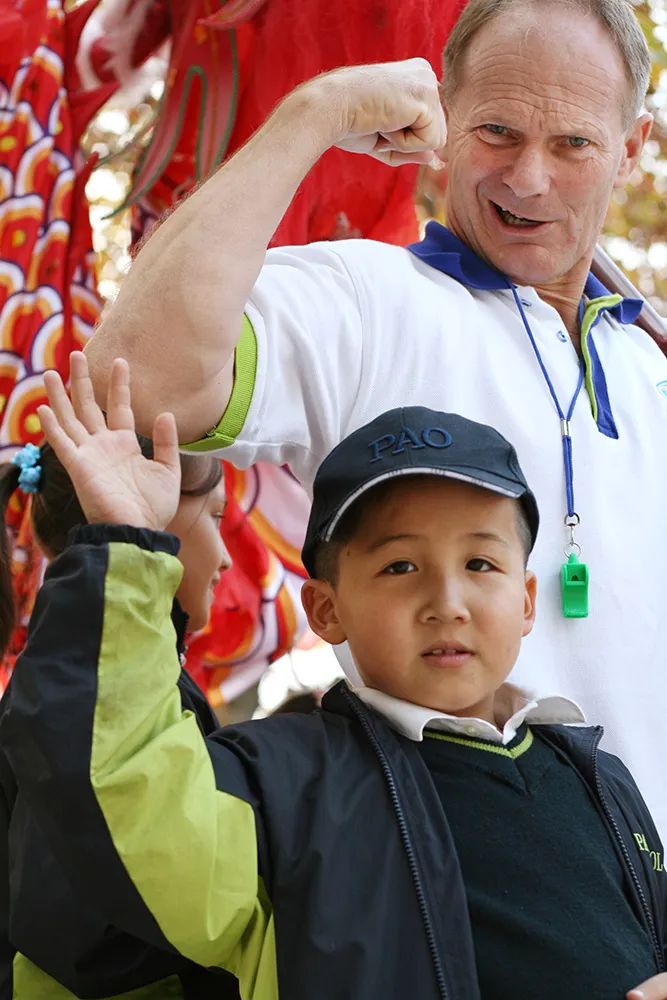
Michael Young with a student
At that time, both the founders and the teaching team agreed that the teaching system of Pao School should integrate Chinese and Western pedagogies, with the course material following the local curriculum. When it comes to teaching methods, Philip Sohmen once said: "There is a course in the primary school curriculum called "Exploration Unit” (EU) which means that the courses stipulated in the Shanghai curriculum are taught in the form of exploration courses, and the units are taught as modules rather than simple knowledge points. For example, water is a unit, which not only includes the content of natural science, but also involves geography and historical development. This helps students form their own comprehensive understanding of this unit through interdisciplinary knowledge. Therefore, in Pao School, the content taught in Chinese and English is not simply divided according to the subject, but based on themes. The Chinese and English teachers jointly prepare lessons to teach the content of a particular theme, which is a type of bilingual immersion learning experience.”
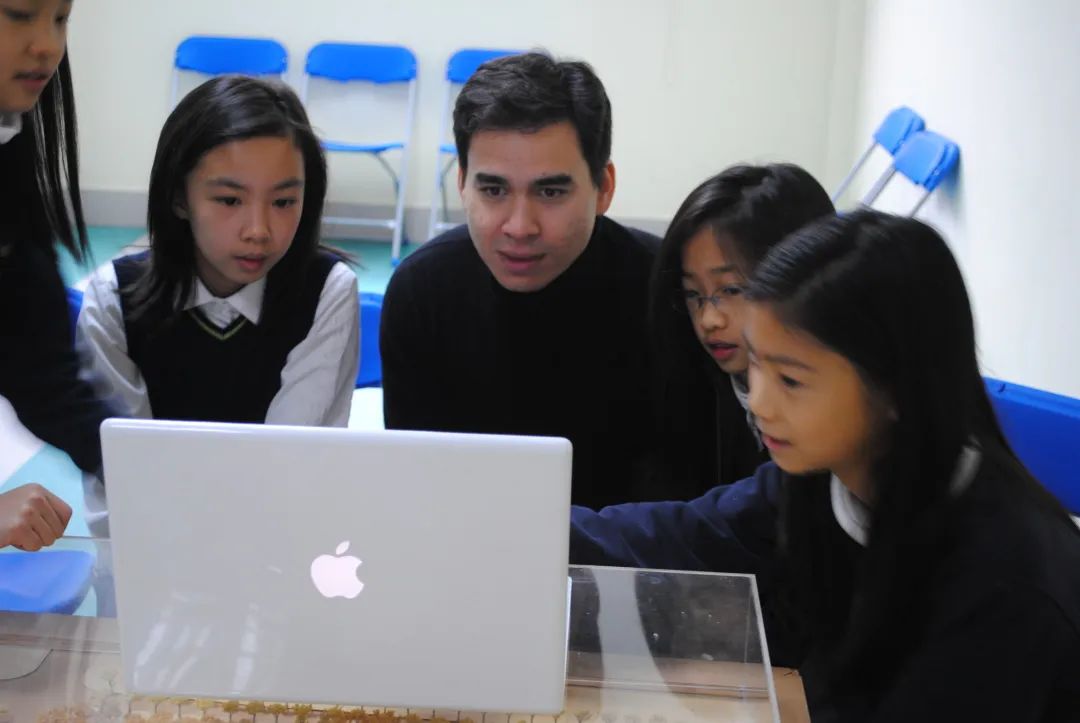
Philip Sohmen, Executive Deputy Chairman, with students
In this regard, former president Wu Zijian noted that to allow foreign teachers and foreign management teams to understand Shanghai’s curriculum and conduct comparative research, the Chinese curriculum standards needed to be more accessible to foreign staff. Pao School, therefore, organised a team to review and translate the curriculum standards into English.
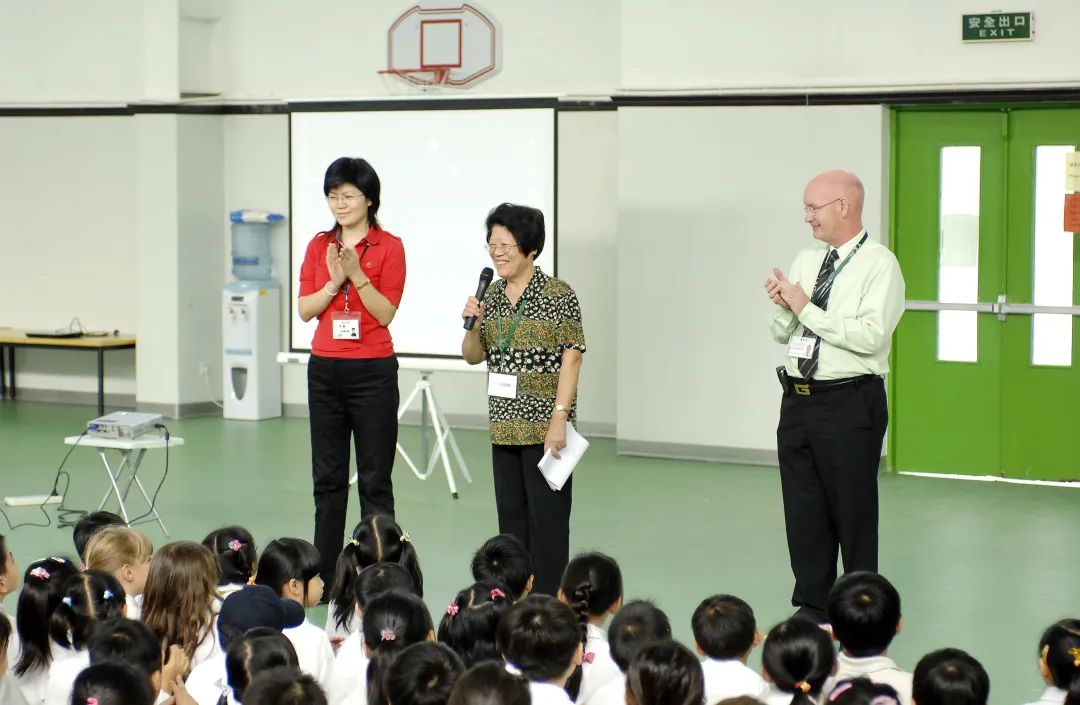
In the early days of the school, the founding Principal Warren Johnston was viewed as an optimistic, imaginative person who deeply understands children. Many of the activities he designed have stood the test of time at Pao School. For example, Maths Night allows parents and children to have fun while learning maths and stimulates children’s interest in the subject – impressively, it remains popular to this day. In addition, other activities established during Mr. Johnston’s time as principal have endured and evolved, including Book Week, camping, and folk-dance night.
Crick Chen says, "What has remained consistent since the beginning is that we have adhered to the tripartite mission of Pao School, cultivating the comprehensive skills important for students’ growth, including both soft/hands-on skills and academic skills. The school creates an authentic learning environment in which theory can be put into practice in an activity or game. The knowledge, skills, and memories that students take away from these experiences are the most memorable aspects of their experience at Pao School.”
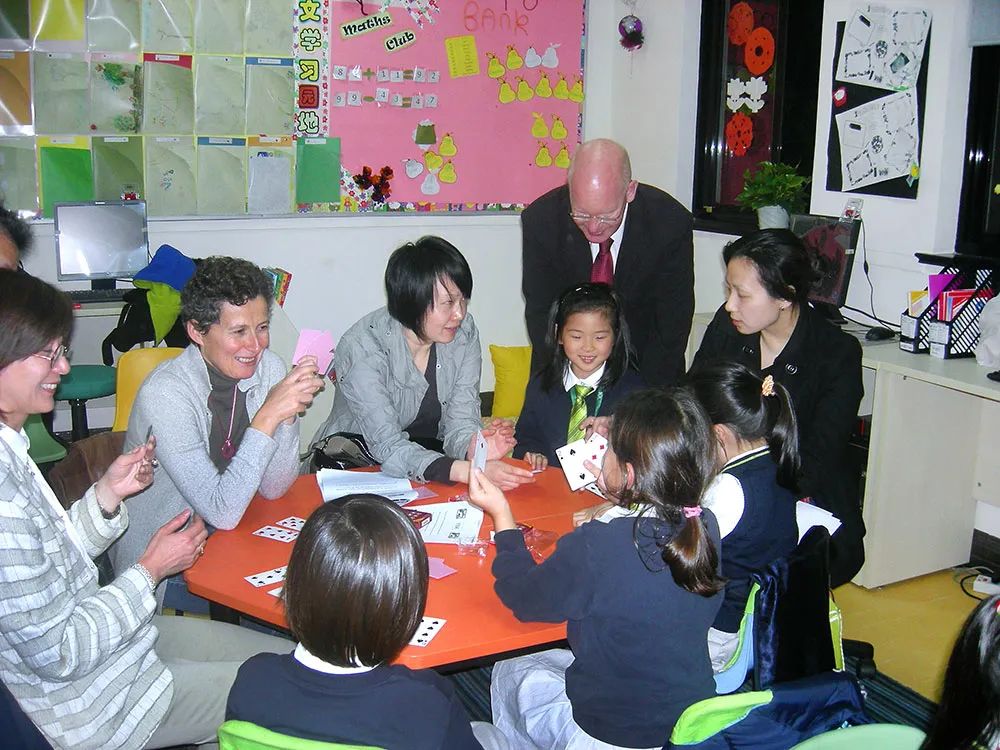
In 2008, a mathematics night was held on the Wuding campus
A lot of Pao School’s unique culture comes from the founders and the expectations they had for all of us. Professor Anna Sohmen Pao and Philip Sohmen set the expectation that we would be working together and that this was innovative. When we were sharing an office, we would do all our meetings together, rather than have a local staff meeting and an international one. It's important to bring everybody together, to have that expectation that we were working towards a common goal.
—— Warren Johnston
In addition to the courses and faculty, parents always show great interest in matters related to campus construction. Looking at the current Pao School campus, with its red brick buildings and beautiful greenery, Zoe He, the President’s Office Archivist, recalls just how far the school’s campuses have come since those challenging early days: "I still remember the summer of 2010 when the three founders often visited the construction site to inspect renovation work in the scorching sun. In order to allow the students and staff to move onto the school’s own campus at the soonest, engineering renovation meetings were held frequently, and the schematic diagram changed frequently. The construction firm and the consulting company were both industry leaders, and Professor Anna Sohmen Pao always strove for perfection and worked to ensure the students of Pao School have access to the best campus facilities.”
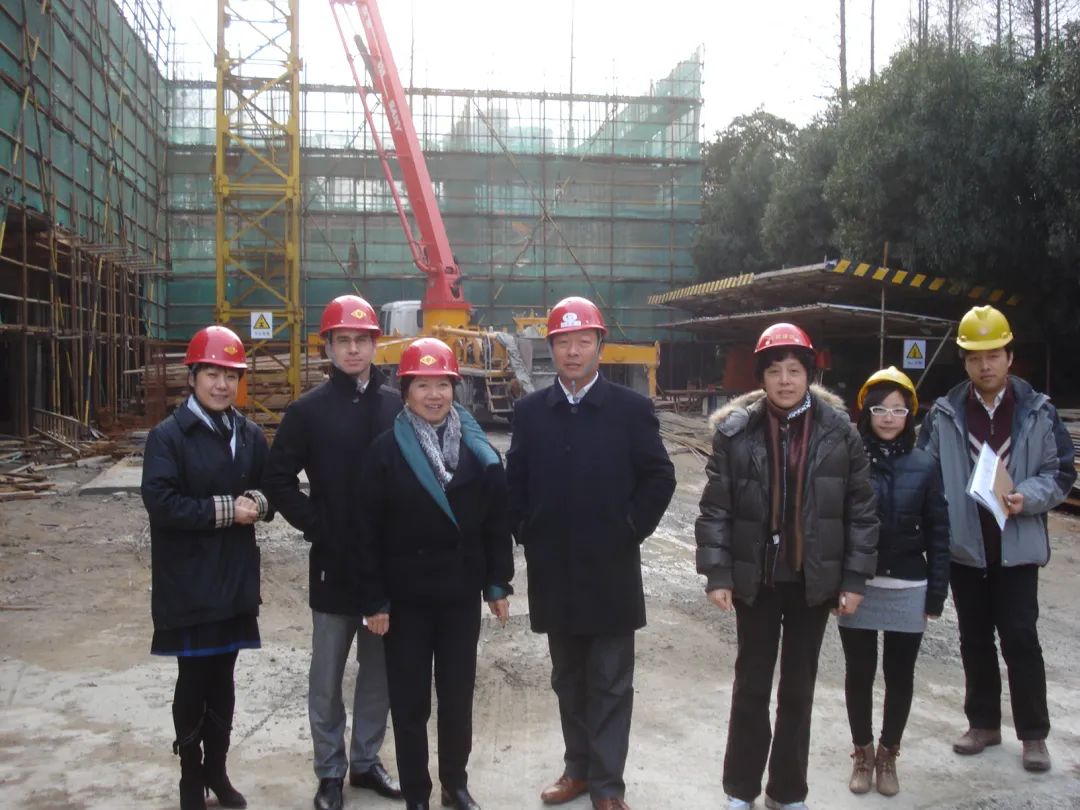
Professor Anna Sohmen Pao and Deputy Chairman Philip Sohmen at the Wuding Campus construction site in 2009, planning how two buildings can be completed in one year
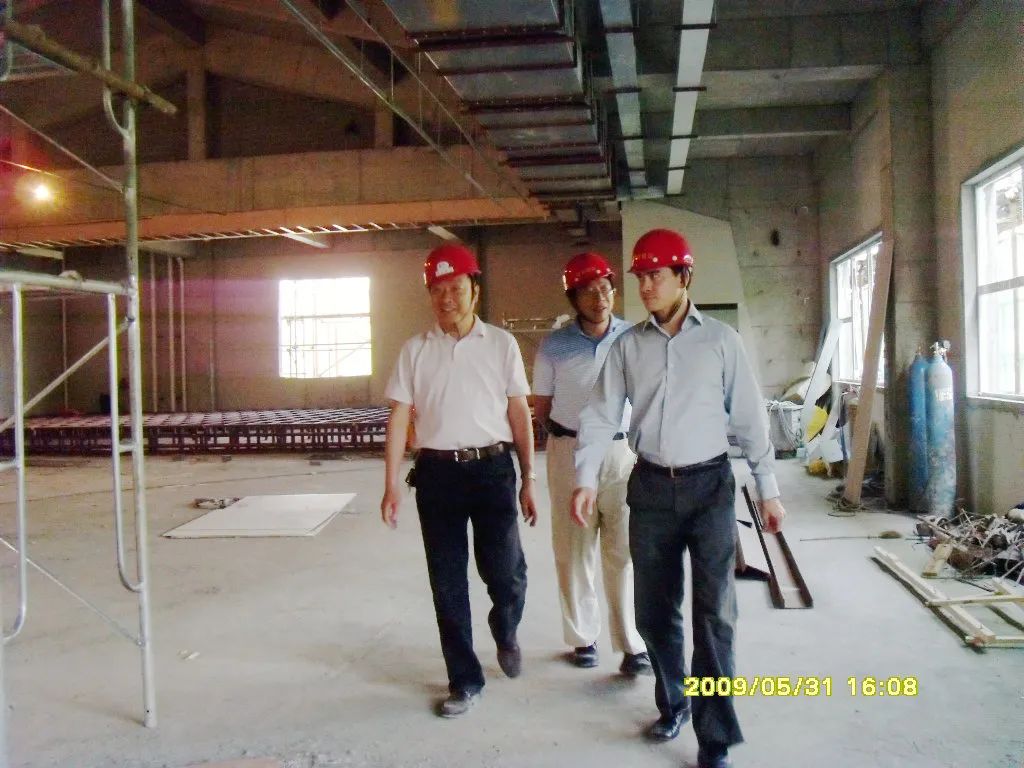
The founders inspect the construction of Wuding campus
Mr. YK Pao had a motto: “Exercise persistently, use sparingly, work diligently.” Professor Anna Sohmen Pao once shared that no matter how busy YK Pao was, he would always insist on swimming and jumping rope daily to keep his body and mind strong. Lanco Ke, currently Operations Director of Hongqiao Campus, served as the project coordinator during the founding of the school. During her time at the school, she has worked closely with the founders on the design and construction of the Wuding, Songjiang and Hongqiao campuses. There have been various challenges through the years, for example Lanco recalls that the Wuding campus is in a protected historical area, which means that during the campus construction the team also had to protect historical architectural features. Despite all the challenges, Professor Anna Sohmen still insisted on building a swimming pool and an indoor gymnasium. These facilities were built with the hope that the children of Pao School can get ample exercise regardless of weather conditions, especially swimming, which is a full-body aerobic exercise. This concept has lived on in the construction of similar facilities on the Songjiang and Hongqiao campuses, including several years of hard work and preparation for the development of a sports complex on Hongqiao campus.
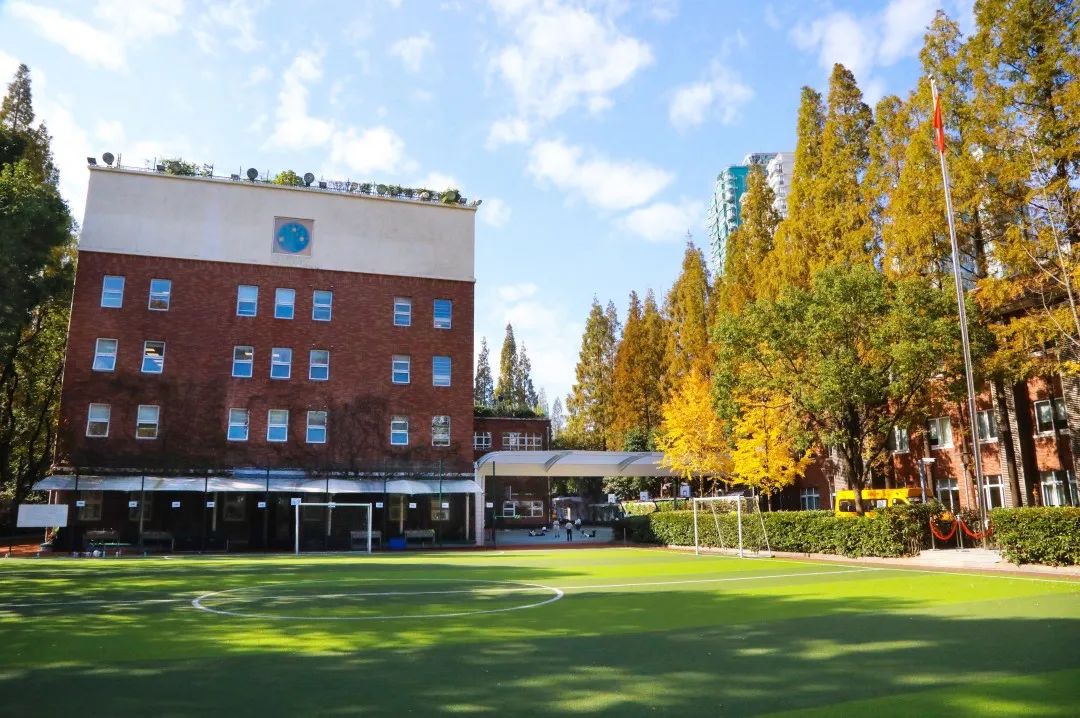
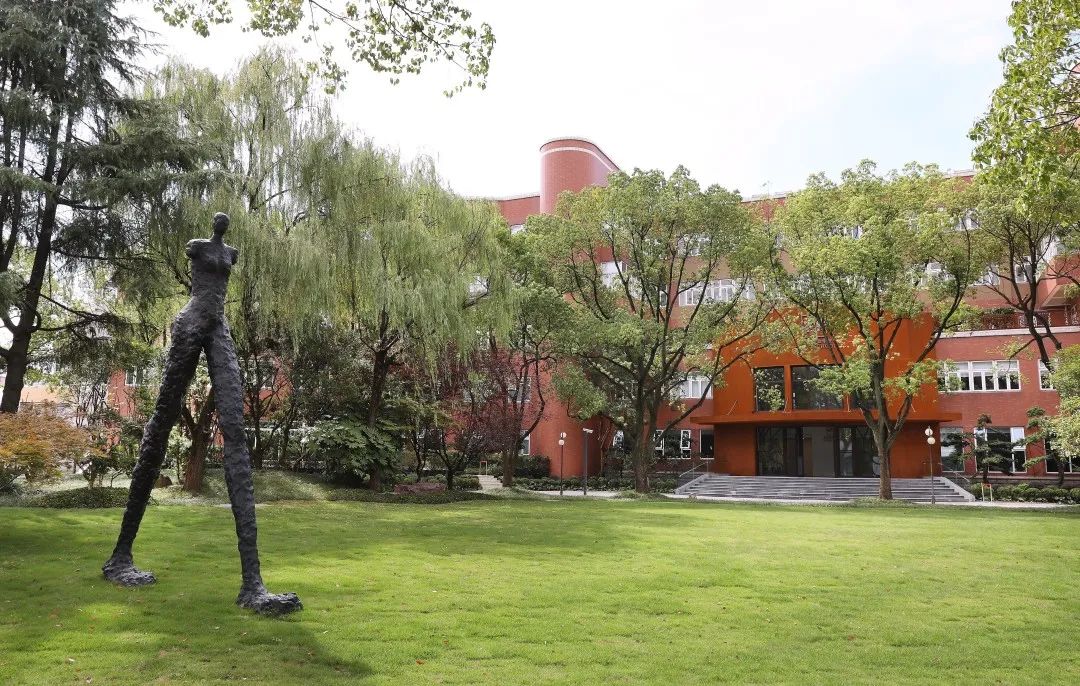
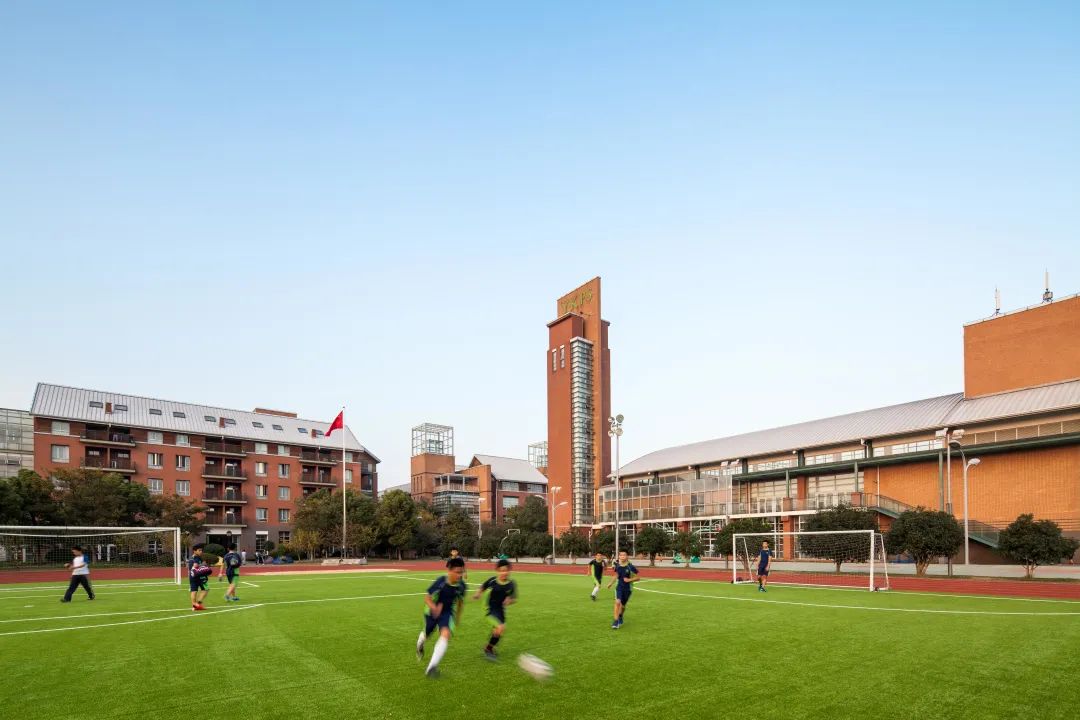
With the great assistance and support of the Municipal Party Committee, governments at all levels, and related parties, Pao School has grown from its temporary school site in the Liuyi Building of Shanghai No. 3 Girls’ High School to three campuses of its own: Wuding campus (established 2010), Songjiang campus (2012) and Hongqiao campus (2017).
After fifteen years of unflagging efforts, the number of students at Pao School has grown from 100 to over 1,600, with alumni worldwide. They not only have excellent academic ability and good character, but also have been successful in science and technology, sports, music, art, and other fields. Some of the first graduates have also returned home after completing their university studies, and have begun to emerge in their respective industries. They are grateful for what Pao School has given them and now want to give back to society. All these positive developments are stepping stones towards Pao School’s aspirations toward building a school for tomorrow’s China and an education for tomorrow’s world.
“Inculcating these values in our students is of paramount importance in our role as educators. The Class of 2017 will hopefully be confident and independent, while also being considerate, good communicators, and reflective leaders – understated but unwavering in upholding their principles.”
—— Professor Anna Sohmen Pao words
Speech given during the celebration of the school’s fifth anniversary in 2012